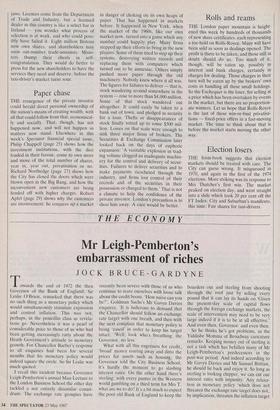Paper chase
THE resurgence of the private investor could herald direct personal ownership of the nation's means of creating wealth, with all that could follow from that, economical- ly and socially. That, though. has not happened now, and will not happen as matters now stand. Elsewhere in this week's Spectator financial special issue, Philip Chappell (page 25) shows how the investment institutions, with the dice loaded in their favour, come to own more and more of the total number of shares, year in, year out, privatisation or no. Richard Northedge (page 27) shows how the City has closed the doors which were blown open in the Big Bang, and how the inconvenient new customers are being fended off with higher charges. Robert Apfel (page 29) shows why the customers are inconvenient: he conjures up a market in danger of choking on its own heaps of paper. That has happened in markets before. It happened in New York, when the market of the 1960s, like our own market now, turned into a game which any number could happily play. Many firms stepped up their efforts to bring in the new players. Some of them tried to step up their systems, destroying written records and replacing them with computers which turned out to be amnesiac. Others simply pushed more paper through the old machinery. Nobody knew where it all was. The figures for failures to deliver — that is, stock wandering around somewhere in the system — rose to more than $4,000 million. Some of that stock wandered out altogether. It could easily be taken to a bank out of town, and pledged as security for a loan. Thefts or disappearances of stock finally totted up to some $500 mil- lion. Losses on that scale were enough to sink three major firms of brokers. The Securities & Exchange Commission later looked back on the days of euphoric expansion: 'A veritable explosion in trad- ing volume clogged an inadequate machin- ery for the control and delivery of secur- ities. Failures to deliver securities and to make payments ricocheted through the industry, and firms lost control of their records and of the securities in their possession or charged to them.' That is not a climate to help the confidence of the private investor. London's precaution is to shoo him away. A cure would be better.









































































 Previous page
Previous page